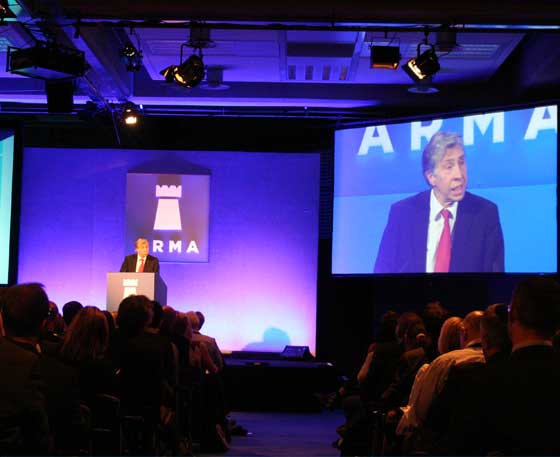 The reform-minded leadership of Association of Residential Managing Agents today made a strong call for backing of ARMA-Q, its scheme to add ethically enhanced backbone to the professional body representing block managing agents.
The reform-minded leadership of Association of Residential Managing Agents today made a strong call for backing of ARMA-Q, its scheme to add ethically enhanced backbone to the professional body representing block managing agents.
An audience of around 300 members at Queen Elizabeth Conference Hall in Westminster was told that that ARMA-Q was a necessary first step to “inevitable” statutory regulation.
The Leasehold Knowledge Partnership was twice referred to in the opening addresses by association CEO Michelle Banks (above), who discretely did not name her organisation’s “fierce critic”, and by the ARMA-Q regulator, former Labour housing minister Keith Hill, who was not so reticent.
“Even LKP is supporting ARMA-Q,” Hill (below) announced, and quoted LKP’s view that his appointment was “a very good choice”.
Sir Peter Bottomley, the Conservative MP for Worthing West, who is driving leasehold issues up the political agenda, was in the audience.
Michelle Banks strongly urged the necessity of ARMA-Q, which after a protracted and complex lead-in period will become an obligatory condition of membership.
All the association’s members should have signed up by January 2015, although there will be a further year’s period of grace for those companies that have genuine grounds for not meeting the criteria. (Examples given are that not all properties have a valid management agreement or “there may be a need to alter business processes significantly”. LKP will explore this point at a later date.)
And for the first time association members were told what membership of ARMA-Q is going to cost: starting at £150 for firms managing fewer than 500 units to £10,000 for those with more than 100,000 units.
There will also be a three-year audit for ARMA-Q members, costing £914 for companies with less than 500 units to £6,150 for companies with more than 100,000 units.
ARMA-Q
“Its aim is to protect consumers and deliver a recognised advantage to our members, through professional self-regulation that guarantees probity, the highest levels of ethics and best practice in all dealings between residential managing agents, intermediaries, landlords and leaseholders.”
ARMA-Q is a weighty, considered piece of work rather than PR window-dressing, but the open question is how its esteemable aims are going to be received by the existing membership.
 Whatever doubts there may be were expressed at the private AGM the day before, but the costs of the scheme could be a real hurdle. And can some ARMA members meet the criteria of ARMA-Q and survive?
Whatever doubts there may be were expressed at the private AGM the day before, but the costs of the scheme could be a real hurdle. And can some ARMA members meet the criteria of ARMA-Q and survive?
One is not thinking only of some of the association’s insalubrious smaller outfits that have joined during recent recruiting drives (membership is just above 300).
There are large corporates whose established modus operandi will not stand up to scrutiny if ARMA-Q is serious.
The proponents of ARMA-Q are gambling that these companies will have to up their game, or walk out into oblivion.
And behind all this is the assumption that ARMA-Q leads on to statutory regulation.
Is there wriggle room for moral compromise and fudging?
Almost certainly, people being people. But in response to LKP’s challenge of whether ARMA-Q has teeth, Michelle Banks and Keith Hill could not have been more bullish.





 What does LKP think of ARMA reforms, we were asked. As the annual conference begins in London today, here we go …
What does LKP think of ARMA reforms, we were asked. As the annual conference begins in London today, here we go …






















I feel that this is really a B-attempt, and we must understand that it is still a trade body regulating its own members who act for their clients. Some of which may related or be the same person or business.
Many sources of tension arise from lawful practices that are seen as unpalatable by flat owners, who fail to understand that the agents are employed by the client and act in their interest, which is not always interchangeable with theirs.
Moreover there are disparities of expectation about service levels between them, and the common fact that most owners haven’t a clue about leaseholds and freely impose service levels and practices from other sectors eg “I don’t pay for the meal before I have eaten it”. ARMA aren’t addressing that in the charter.
For the abuses that occur, these also happen with residents groups and their agents as well, and where client and agent are the same or linked, the latter doesn’t have the option of resigning.
Many managers act as asset managers, often through associated companies and outside ARMA control. Expect more to do the same. However, there are owner managers who act professionally and take the stewardship of the block fairly and professionally.
This is a step forward, but one that falls well short for the reasons stated above. I have been disappointed with ARMA on two cases where ARMA agents took on an RTM and treated it as a handover: loading up tenant and supplier balances from the freeholder(!) and kept existing suppliers, unaware that there is a clean break.
They also kept the bills and Section 47/48 notices in the name of the freeholder, not the RTM.
In another case the ARMA agent acting for an RTM is sending the unamended 2007 service charge summary and were unaware of the admin summary, and refuse to accept the correction. They have added legal costs to some owner’s bills who are rightly withholding. In both cases the response has been underwhelming.
The approach still seems to be “well, exercise your rights and go to the FTT or Ombudsman” when a simple call could have resolved both issues. In the early days that’s what used to happen.
I would like to see legislation that extends the LVT manager concept with agents appointed as trustees based on a smaller majority or say the right to acquire criteria rather than just RTE and RTM, under the purview of the FTT.
That would greatly enhance leaseholder ability to have a professional manager who is accountable, and a framework to resolve disputes over priorities.
Perhaps in the future that is how all agents could or must be appointed, and barred from financial association of any form to suppliers or owners.
I would add licensing on a compulsory basis inc residents group based on the IRPM syllabus, who should merge with ARMA. And pigs will have wings.
ARMA-Q an industry white elephant
ARMA is a trade association founded to benefit the business interests of its members who are managing agents. Unlike the professional body, RICS, ARMA members do not need to pass exams or subscribe to any professional standards, ethics or codes of conduct – as they profess to do. When they fail, nobody challenges them, certainly not ARMA.
Yet, if ARMA members were to observe the RICS Service Charge Residential Management Code – as they claim they do – there would be no need for ARMA-Q. ARMA-Q is a white elephant. Rather than serve any purpose of self-regulation, ARMA-Q will diffuse, confuse and weaken existing regulatory mechanisms. Leaseholders will suffer.
As to an often discussed issue of whether or not managing agents should be allowed to hold service charge funds, the answer is ‘no’ they should not. Dishonestly and in breach of the RICS Code, ARMA management agreements include a clause that allows its members to share interest earned on service charge monies 50/50 with the fund to which the money belongs.
But, neither is it necessary to hold service charge funds in statutory third-party accounts as is the case with deposits in the shorthold tenancy sector.
There is no reason why flat management companies or right-to-manage companies – both of which are controlled by the Companies Act 2006 – should not hold service charge monies in bank accounts in their own name on behalf of their shareholders. Directors of FMCs and RTMs are ultimately responsible and liable to their shareholders and should be encouraged to take charge of service charge funds in the interests of their companies and shareholders.
Totally agree Sue, ARMA Q will be as useless as ARMA has been!!
As you rightly say IF all ARMA members observed the RICS code and all the other statutory legislation there would be no need for ARMA Q or even websites such as these!!
Having said that I still think Leasehold should be abolished altogether.